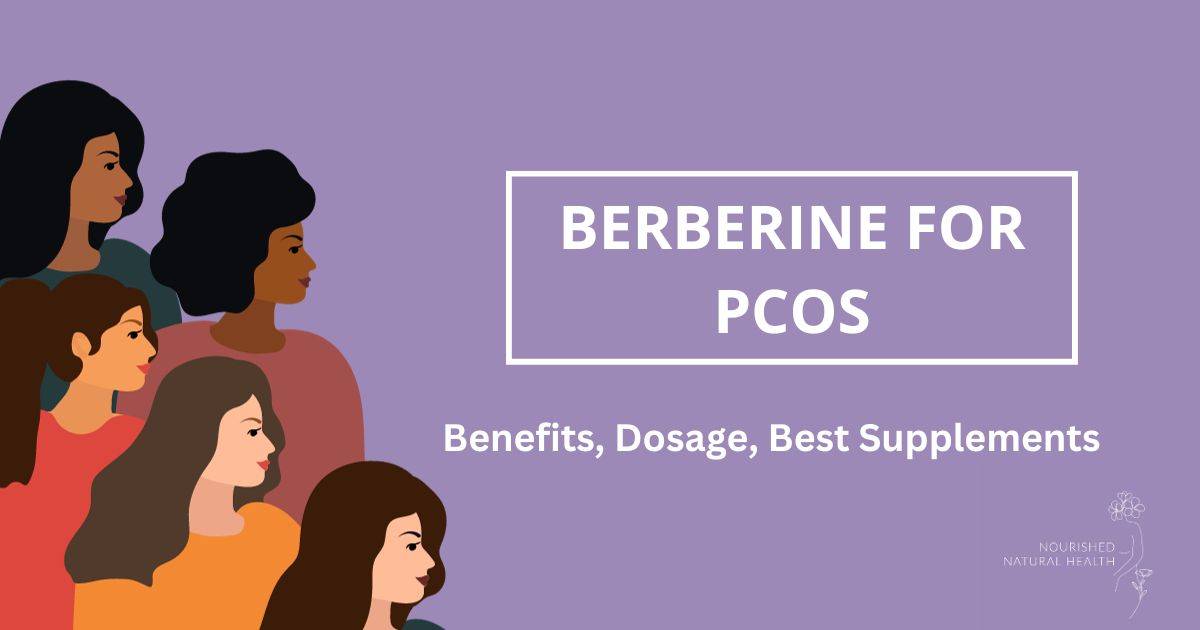
PCOS
Four simple letters that make every woman concerned for her health.
This dreaded abbreviation is the common shorthand for Polycystic Ovary Syndrome.
This health condition affects as many as five million women across the U.S., according to the Center for Disease Control (CDC).
The symptoms associated with PCOS include unnaturally high levels of androgens (male hormones), and a resistance to insulin.
The excess male hormones affect the release of egg cells from the ovaries, causing them to become stunted and cyst-like in appearance.
Other health complications for women experiencing PCOS include irregular ovulation, infertility, and a higher likelihood of contracting type-2 diabetes.
It’s a lifelong health condition that can persist even after a woman’s child-bearing years have passed.
Can PCOS be Treated?
Even though PCOS is a chronic condition, it can be treated with lifestyle changes and medicine.
As research on PCOS continues, conventional and alternative treatment methods have emerged.
One promising supplement that has been shown to fight PCOS symptoms on multiple levels is Berberine.
This is a naturally occurring compound usually found in plants from the family Berberidaceae, though it also appears in other families.
Many of these plants have been used for centuries in traditional medicine.
The chemical extract of berberine has the appearance of a yellowish powder.
Let's look closer at how Berberine supplements can help women experiencing PCOS.
How Does Berberine Work at a Molecular Level?
Berberine stimulates the release of AMP-activated protein kinase (AMPK) within cells.
Your body needs AMPK to regulate metabolism and energy levels by activating glucose and fatty acid uptake and oxidation.
Studies have determined that berberine also performs other actions, interacting with many molecules within the cells to influence their behavior.
The complete extent of Berberine’s effects on the body has yet to be determined.
Still, it has proven effective in countering the effects of several metabolic diseases, like type-2 diabetes, obesity, non-alcoholic fatty liver disease, hyperlipidemia, and gout.
Key Benefits of Berberine for PCOS
In what is great news for women with PCOS, Berberine supplements have shown the potential to treat the symptoms.
This is due to how Berberine triggers several positive changes within your body that directly counteract PCOS symptoms.
1. Insulin Sensitivity and Blood Sugar Control
PCOS can cause hyperinsulinemia, in which the body produces too much insulin, the hormone that regulates blood sugar levels.
This leads to insulin resistance, which leads to unhealthy, high blood sugar levels. Studies have found that Berberine can increase your body’s insulin sensitivity, countering insulin resistance and controlling blood sugar levels.
What’s even more impressive is that Berberine’s results were found to be comparable to metformin, a chemical drug approved for PCOS treatment by the FDA.
2. Regulation of Androgens and Hormonal Balance
Insulin resistance is just one of the many symptoms of PCOS, which are all linked to the underlying cause of high androgen levels.
The balance between male hormones like testosterone and female hormones like progesterone is skewed heavily towards the male side, causing most of the complications linked to PCOS.
This condition is called hyperandrogenaemia.
Clinical studies have found that Berberine intake reduces androgen levels in women.
3. Impact on Ovulation and Fertility
PCOS wreaks havoc on a woman’s menstrual cycle.
This is because the cysts that form in the ovaries are actually stunted, immature egg sacs.
Since these eggs do not develop to maturity and form a cyst instead, this can disrupt the menstrual cycle.
When the cysts prevent ovulation from occurring, the condition is called chronic anovulation and can cause infertility in women.
Multiple studies have found that Berberine supplements restore regular ovulation, allowing women with PCOS to become pregnant.
@nourishednaturalhealth Incase you were wondering, there are other ways to reverse and manage your PCOS symptoms besides birth control 👀 Follow along to learn more! #pcos#pcostips#pcoshacks#pcossymptoms#pcosproblems#pcoscysters#pcosstruggles#pcosremedies#healthymealideas#healthylivingtips#healthylivinginspo#pcoslifestyle#pcosweightloss#pcosdiet♬ original sound - Nourished Natural Health PCOS
4. Weight Management
One more side effect of hyperandrogenaemia is weight gain.
However, Berberine has been found to target fat cells and reduce fat storage.
Not only does it interact with the fat cells directly, but it also suppresses levels of leptin, an appetite-stimulating hormone.
Regular intake of Berberine leads to weight loss and reduced body mass index (BMI).
5. Inflammation and Immune Modulation
Plants containing Berberine have been touted in schools of traditional medicine for their anti-inflammatory properties for centuries.
Berberine supplements also boast anti-inflammatory properties that counter the chronic, low-grade inflammation that accompanies PCOS.
The health benefits of Berberine also provide a boost to the immune system.
@nourishednaturalhealth Incase you were wondering, there are other ways to reverse and manage your PCOS symptoms besides birth control 👀 Follow along to learn more! #pcos#pcostips#pcoshacks#pcossymptoms#pcosproblems#pcoscysters#pcosstruggles#pcosremedies#healthymealideas#healthylivingtips#healthylivinginspo#pcoslifestyle#pcosweightloss#pcosdiet♬ original sound - Nourished Natural Health PCOS
Berberine Dosage for PCOS
Berberine supplements are safe for adults to consume.
However, you should still consult your doctor before starting since possible side effects include diarrhea, constipation, and other gastrointestinal issues.
Berberine could also react with certain medications and drugs, which is why you need your doctor’s approval.
Ideal Dosage
Current research states that the ideal dosage of berberine is 500 mg three times a day.
When and How to Take Berberine
Berberine is most often taken in capsule form.
Some supplements also come as powders and liquids.
The best time to take berberine supplements is with meals.
The dosage should be staggered: Take only 500 mg for the first week, add another 500 mg the next week, and finally work up to three doses the week after.
This will prevent stomach issues if your body is unused to the supplements.
@nourishednaturalhealth Lost and confused about what supplements to take for your PCOS type and symptoms? The answer is HERE! #pcos#pcosawareness#pcosproblems#pcosfighter#supplements#pcossupplements#supplementsthatwork♬ original sound - Nourished Natural Health PCOS
Importance of Consistency and Duration for Visible Results
The benefits of Berberine will only take hold if the dosage is consistent.
Consult your doctor on how long you should take Berberine supplements; most regimens last three to six months.
Choosing the Best Berberine Supplement for PCOS
Check with your doctor to determine which Berberine supplement you should use to treat PCOS.
You can judge whether a product is right for you by these criteria:
-
Purity and Potency: Determine your ideal dosage with the doctor since supplements come in variants containing 100 mg to 1,500 mg of Berberine.
-
Manufacturing Standards: Since the FDA doesn’t regulate Berberine supplements, you should check for third-party testing labels to ensure the product is safe.
-
Synergistic Combination With Other Ingredients: Some supplements contain more than just Berberine, so choose ones that will enhance its efficacy.
- Company Reputation and Expertise: Always check the reviews and history of any company before buying nutritional supplements.
Why Nourished Natural Health Stands Out
Dealing with PCOS can be difficult, but you don’t have to do it alone.
At Nourished Natural Health, we’ve made it our mission to help women overcome PCOS.
Our range of Berberine-enhanced supplements helps our Cysters attain their goals, be it weight management, skin and hair health, or menstrual cycle regulation.
Shop for Berberine supplements on our website and conquer PCOS together.
Frequently Asked Questions about Berberine and PCOS
What exactly is Berberine, and where is it sourced from?
Berberine is a naturally occurring alkaloid compound extracted from plants from Berberidaceae, Annonaceae, Menispermaceae, Papaveraceae, Ranunculaceae, and Rutaceae.
What does Berberine do for PCOS?
Berberine has multiple benefits for women with PCOS, including hormone regulation, improved insulin sensitivity, menses restoration, improved fertility, weight loss, and better skin and hair health.
How much Berberine should I take for PCOS?
The ideal dosage for berberine supplements is between 500 mg to 1,500 mg per day.
Is there a specific time of day that's best for taking Berberine?
The best time to take Berberine supplements is with meals.
How long should I take Berberine for PCOS?
Berberine is not a long-term solution.
You should take Berberine for between three to six months to see results.
How does Berberine compare to Metformin in treating PCOS symptoms?
Multiple studies have found that Berberine is comparable to Metformin in treating hyperinsulinemia, hyperandrogenaemia, and chronic anovulation.
How quickly can I expect to see results after starting a Berberine regimen?
Berberine supplements are most effective when taken consistently over a fixed period.
You can expect to see results within 90 days, or three months, from starting a berberine regimen.
Are there any common side effects associated with Berberine consumption?
While Berberine is considered safe for general consumption, some side effects have been recorded.
These include nausea, diarrhea, constipation, and gastrointestinal pains.
Can I take Berberine during my menstrual cycle, or should I pause?
Yes, it is safe to take Berberine supplements during your menstrual cycle.
However, you should not take Berberine if pregnant or breastfeeding an infant.
Is Berberine suitable for all women with PCOS, or are there certain types of PCOS it's most effective for?
Berberine is a promising treatment for PCOS.
Since it works on combating so many of the syndrome's symptoms, all women who are experiencing PCOS may consider Berberine to manage their condition once checking it over with their health care professional.








No Comments Yet
Be the first to share your thoughts!
Leave a Comment